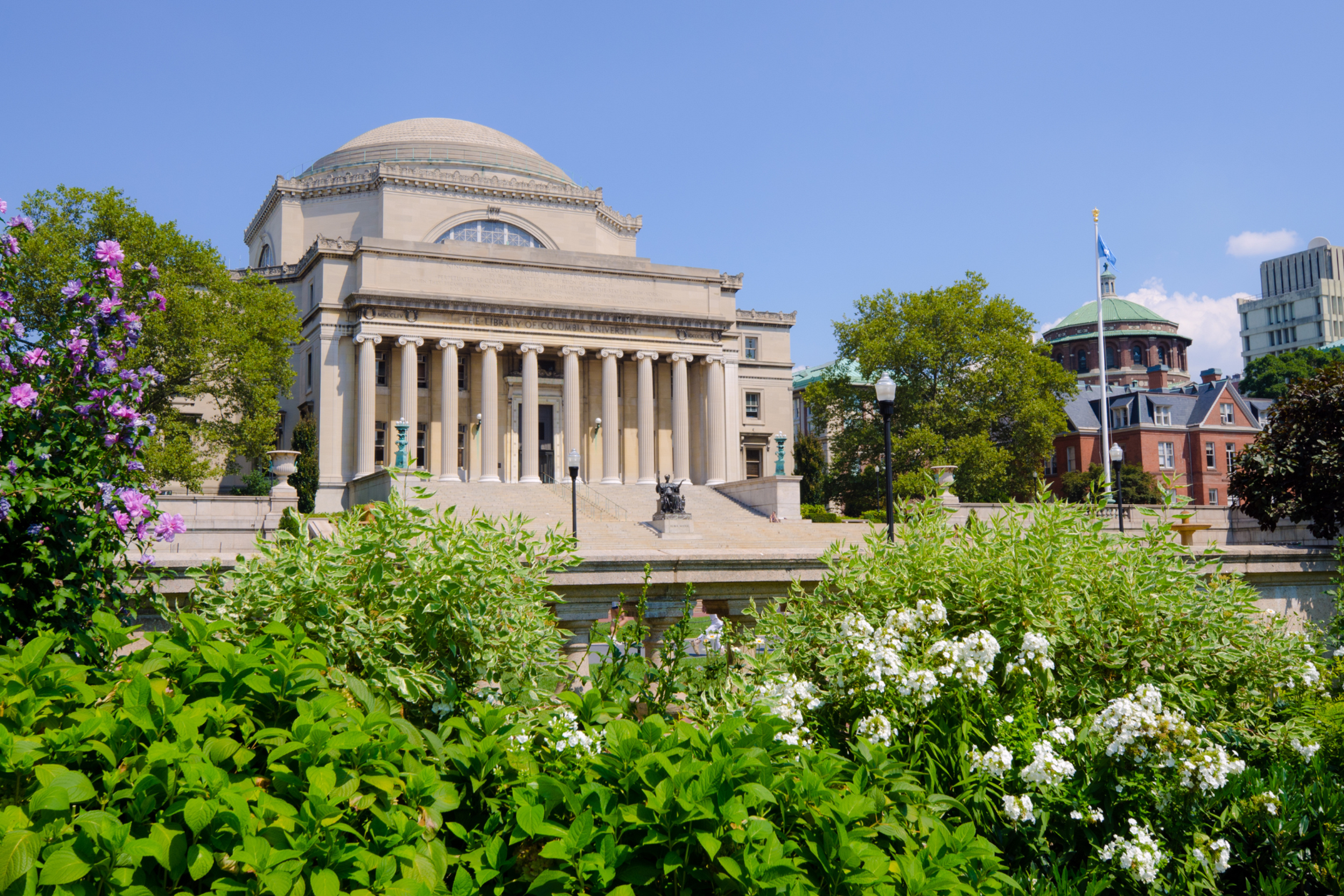
Table of Contents
Free Event

Featuring Horatiu S.
Profile Power: A LinkedIn Profile That Gets You In
Starting Tuesday, September 2
11:00 PM UTC · 45 minutes

Featuring Horatiu S.
Considering the Columbia Executive MBA (EMBA)? You're not alone. Columbia Business School’s EMBA is one of the most competitive and respected executive MBA programs in the world. With flexible formats, a powerful NYC location, and unmatched access to industry leaders, Columbia attracts EMBA students from across industries who are ready to accelerate their careers without stepping off the ladder.
In this guide, we’ll walk you through everything you need to know — from program structure and curriculum to admissions strategy, tuition, and post-MBA outcomes.
Why Choose the Columbia EMBA?
The Columbia EMBA isn’t just about earning a degree but also about stepping into one of the most influential business ecosystems in the world. From Wall Street to Silicon Alley, Columbia puts you at the center of global commerce, with a curriculum and network built to help high-performing professionals level up fast.
What truly sets Columbia University apart? It’s not just the brand (though that certainly opens doors). It’s the real-time relevance, the rigor, and the relationships you build inside and outside the classroom.
What makes Columbia’s EMBA different:
- New York City location - You’ll study just blocks from Central Park, with daily proximity to the world’s most powerful firms in finance, media, consulting, and tech. Guest speakers, site visits, and recruiting events aren’t theoretical here — they’re integrated into the experience.
- Faculty who live what they teach - Classes are led by a mix of leading researchers and high-level practitioners, including adjunct professors who run hedge funds, consult Fortune 100s, or lead cutting-edge startups. You’re not learning from slides — you’re learning from people who shape the field.
- Built-in global perspective - Through required global immersions and programs like EMBA-Global Americas & Europe, you’ll study across continents with peers from London Business School and other top institutions. It’s one of the few executive MBA programs that bake global exposure into the core experience.
- Peer learning on steroids - With a cohort of experienced EMBA students (average age: ~36), Columbia leans into the power of the room. Class discussions, learning teams, and group projects are designed to pull insight from your peers, not just deliver content top-down.
- Immediate ROI - Classes are held on weekends, so you can apply what you learn on Monday. Columbia reports that a majority of students receive promotions, raises, or expanded scope before graduation.
"“The Columbia EMBA gave me confidence, access, and clarity. I walked in as a functional lead. I walked out with a running strategy.” "
– CBS EMBA graduate
Columbia EMBA Program Formats
Columbia offers three distinct EMBA programs designed for mid- to senior-level professionals:
| Format | Class Days | Duration | Location |
|---|---|---|---|
| EMBA-New York Friday/Saturday | Biweekly Fri & Sat (8:30 a.m.–6:45 p.m.) | 20 months | NYC Campus |
| EMBA-New York Saturday | Weekly Saturdays (8:30 a.m.–6:45 p.m.) | 24 months | NYC Campus |
| EMBA-Global Americas & Europe | Monthly block weeks (Mon–Sat, 8:00 a.m.–7:30 p.m.) | 20 months | NYC, London & Global Immersions |
Residence weeks and conference center accommodations are included throughout the programs to foster cohort bonding and immersive learning.
Pro Tip: If you’re considering options like London Business School, Columbia’s EMBA-Global Americas program (co-run with LBS) offers a dual perspective that spans continents.
Inside the Columbia EMBA Curriculum
The Columbia EMBA curriculum is designed to give experienced professionals a broad and practical foundation in business fundamentals, then allow them to tailor their second year through electives, global immersions, and experiential learning.
Core Curriculum (Year 1)
Students begin with a rigorous slate of core courses that build fluency in key business disciplines:
- Corporate Finance
- Marketing Strategy
- Managerial Statistics
- Financial Accounting
- Strategy Formulation
- Operations Management
- Business Analytics
- Global Economic Environment
- Managerial Economics
- Leadership and Organizational Change
These courses are structured to balance theory with real-time workplace application — most students report applying concepts to work immediately.
Electives & Customization (Year 2)
In the second year, EMBA students choose from a wide range of electives — often alongside full-time MBA students. Popular electives include:
- Entrepreneurship and Venture Planning
- The Future of Global Business
- Advanced Financial Statement Analysis
- Leading Innovation
- Climate Finance and Impact Investing
- Data Science for Business
- M&A Strategy
- The Business of Health
Students can mix electives from EMBA, MBA, and even cross-disciplinary areas such as law or public policy.
Experiential & Global Opportunities
- Global Immersion Seminars - One-week electives in cities like São Paulo, Tel Aviv, or Shanghai to study global business up close.
- In-Class Consulting Projects - Tackle real problems for actual companies, often tied to innovation or strategy courses.
- Executive Leadership Intensives - Weekend modules with senior leaders from finance, consulting, healthcare, and tech.
- Learning Teams - Assigned at the start of the program and used across courses to mirror real-world team collaboration.
Admissions Process & Eligibility
Columbia Business School’s EMBA admissions process is rolling, which means applications are reviewed as they’re received, and spots can fill up well before final deadlines. The process is holistic and highly selective, especially for the New York-based formats.
Here’s what you need to know to apply strategically:
Who Should Apply
Columbia EMBA applicants are typically mid- to senior-level professionals who have:
- 8 to 20+ years of professional experience, often including management responsibility or deep functional expertise
- A strong academic background (GPA, rigor of coursework, optional test scores)
- Evidence of leadership potential and career progression
- A clear reason for pursuing an EMBA at this stage of their career
- Support from their current employer, particularly for time off during class weekends and residence weeks (financial sponsorship is encouraged but not required)
Columbia’s EMBA cohort includes professionals from finance, consulting, media, tech, healthcare, nonprofit, and entrepreneurship. Diverse professional backgrounds are welcome.
Read: The EMBA Degree: What's Required
Application Requirements
To apply to the Columbia Executive MBA program, you’ll need:
- Online application form
- Academic transcripts from all undergraduate and graduate institutions
- Two letters of recommendation, ideally from supervisors or senior colleagues who can speak to your leadership and impact
- Professional resumé (typically 1–2 pages)
- Short-answer essays (covering career goals, leadership experience, and why Columbia)
- Optional test scores (GMAT, GRE, or EA — not required, but helpful if you want to bolster your academic profile)
- Interview, by invitation only, conducted virtually or on campus
Admissions Timeline & Deadlines
| Program Format | Start Term | Final Deadline | Recommended Deadline | Decision Timeline |
|---|---|---|---|---|
| EMBA-New York Saturday | May 2025 | February 12, 2025 | November 27, 2024 | Rolling, typically 6–8 weeks |
| EMBA-New York Friday/Saturday | August 2025 | May 14, 2025 | March 19, 2025 | Rolling, typically 6–8 weeks |
| EMBA-Global Americas & Europe | May 2025 | January 17, 2025 | November 1, 2024 | Rolling, typically 6–8 weeks |
Acceptance Rate
Columbia does not publish an official acceptance rate for its EMBA, but it is considered one of the most competitive executive MBA programs globally. A strong application, particularly with clear goals, demonstrated leadership, and employer support, is key to standing out.
Tip: Consider working with a top MBA admissions coach who can help you frame your unique career story, help you position your experience, clarify your goals, and make your application impossible to ignore.
Tuition, Total Cost & Financial Aid
Tuition & Fees
The total tuition for the Columbia Executive MBA varies slightly by program format, but for the 2024–2025 academic year, it is approximately $233,088 for both the Friday/Saturday and Saturday-only programs. The EMBA-Global program costs approximately $223,800, split between Columbia and London Business School.
That figure includes:
- All tuition and required fees
- Books and course materials
- Meals and refreshments on class days
- Hotel accommodations during residence weeks
- Global immersion program fees (travel and lodging included)
Note: While the tuition includes most program-related expenses, students are responsible for transportation to and from campus, incidental travel costs, and accommodations if they choose to stay locally during non-residential weekends.
Time off work, particularly for residence weeks, block classes, and global travel, should also be factored into your total cost.
Financial Aid Options
Columbia offers a mix of financing strategies to make the EMBA investment more accessible. While students are expected to contribute meaningfully, there are real ways to offset the burden.
Scholarships & Fellowships
- Columbia offers merit-based fellowships to EMBA applicants who demonstrate exceptional academic, professional, or leadership potential.
- These awards are competitive and range from $10,000 to $30,000+.
- You’ll be automatically considered for most scholarships when you apply — no separate application is needed.
Student Loans
- Columbia EMBA students are eligible for federal loans (U.S. citizens/permanent residents) and a variety of private loan options for both U.S. and international students.
- CBS partners with Prodegy and Discover for graduate business loans and offers resources to compare rates and plans.
- Most loans allow for deferred repayment until after graduation.
Employer Sponsorship
- Around 30% of EMBA students receive full or partial financial support from their employers.
- Even if your company won’t fund the full cost, many will support tuition assistance, paid time off, or professional development budgets.
- Columbia provides a downloadable employer sponsorship toolkit to help you build a business case.
Note: Employer support doesn’t have to be all or nothing. Even covering a portion of tuition or offering flexibility around travel days can make a huge difference.
Read: MBA Financial Aid: How to Pay for Business School
Career Outcomes & Alumni Network
Career Impact
For many students, the Columbia Executive MBA is a career accelerator, not just a credential. Graduates frequently cite rapid promotions, expanded leadership scope, and access to new industries as direct outcomes of the program. Some move from director to VP roles before graduation. Others use the degree to pivot entirely, transitioning from finance to tech, from corporate to consulting, or from legal practice to operational leadership.
A recent Columbia EMBA career report showed average post-graduation salary increases of 30–40%, with significant growth in finance, consulting, healthcare, tech, and private equity. Beyond compensation, students often gain exposure to high-stakes strategy work, board-level visibility, and entrepreneurial funding opportunities that were previously out of reach.
Career support isn’t just reactive. Columbia’s Career Management Center partners with EMBA students from day one — whether you’re seeking advancement within your company, exploring a pivot, or launching a venture. Coaches help with resume positioning, board resume formatting, compensation negotiation, and strategic networking — all tailored to experienced professionals with 10–20+ years of experience.
Alumni Network
When you join Columbia Business School, you join a global network of over 48,000 alumni across 130+ countries. That includes leaders at Blackstone, Google, McKinsey, Pfizer, and thousands of influential startups, nonprofits, and family businesses. You’ll gain access to a powerful professional community through curated events, industry councils, speaker series, and regional meetups — not to mention lifelong access to CBS career support.
Columbia EMBA alumni have a strong reputation for being collaborative, responsive, and generous with their time. Whether you’re looking to break into a new industry, raise capital, or expand internationally, you’re never more than one introduction away from someone who’s been there.
Read: 10 Notable Columbia Business School Alumni
Final Thoughts
The Columbia Executive MBA program offers a rare combination: Ivy League pedigree, real-time ROI, and access to New York’s most powerful industries. With its rigorous curriculum, flexible formats, and focus on leadership development, it’s a top choice for professionals ready to take the next leap.
If Columbia EMBA is on your radar, make sure your application reflects the clarity, depth, and ambition the program looks for.
Want 1:1 help with your Columbia EMBA application? Work with a top EMBA admissions coach on Leland to craft standout essays, prep for interviews, and boost your odds of admission. Browse top MBA coaches here.
Read these next:
- Columbia Business School MBA: Acceptance Rate, Deadlines, Cost, Requirements, & Program Overview
- The Different Types of MBA Programs—and Which One is Right for You
- What is an MBA Degree? An Expert Guide
- 25 Best Executive MBA Programs in the World
- The 10 Best MBA Admissions Consultants
FAQs
Can I apply to Columbia's EMBA program if I already have an MBA?
- Yes, applicants who already hold an MBA or a similar degree in management studies are eligible to apply to Columbia's EMBA program. However, it's important to have a compelling reason for pursuing another MBA, such as seeking a different academic experience or aiming for specific career goals that the Columbia EMBA can uniquely support.
Is employer sponsorship required for the EMBA program?
- Employer sponsorship is not mandatory for all EMBA formats. For the Friday/Saturday option, applicants must obtain written authorization from their employer to attend classes during workdays. Financial sponsorship is optional. For the Saturday-only option, no employer sponsorship is required.
Are fee waivers available for the EMBA application?
- Yes, fee waivers are available for active-duty U.S. military personnel. Applicants must provide proof of current service and explain their need for a fee waiver. The request can be made through the application portal or by contacting the admissions office.
What are the standardized test requirements for EMBA applicants?
- All EMBA applicants are encouraged to submit a valid standardized test score (GMAT, GRE, or Executive Assessment). However, based on a review of an applicant's resume and transcripts, a waiver for the test score may be granted.
Can EMBA students customize their curriculum through electives?
- Yes, EMBA students have the opportunity to customize their curriculum by selecting from a wide range of electives, primarily in their second year. They can choose from approximately 30 electives over three terms and may also take electives from the Full-Time MBA Program or a maximum of two courses from Columbia’s other professional schools, such as Law or Public Health.











